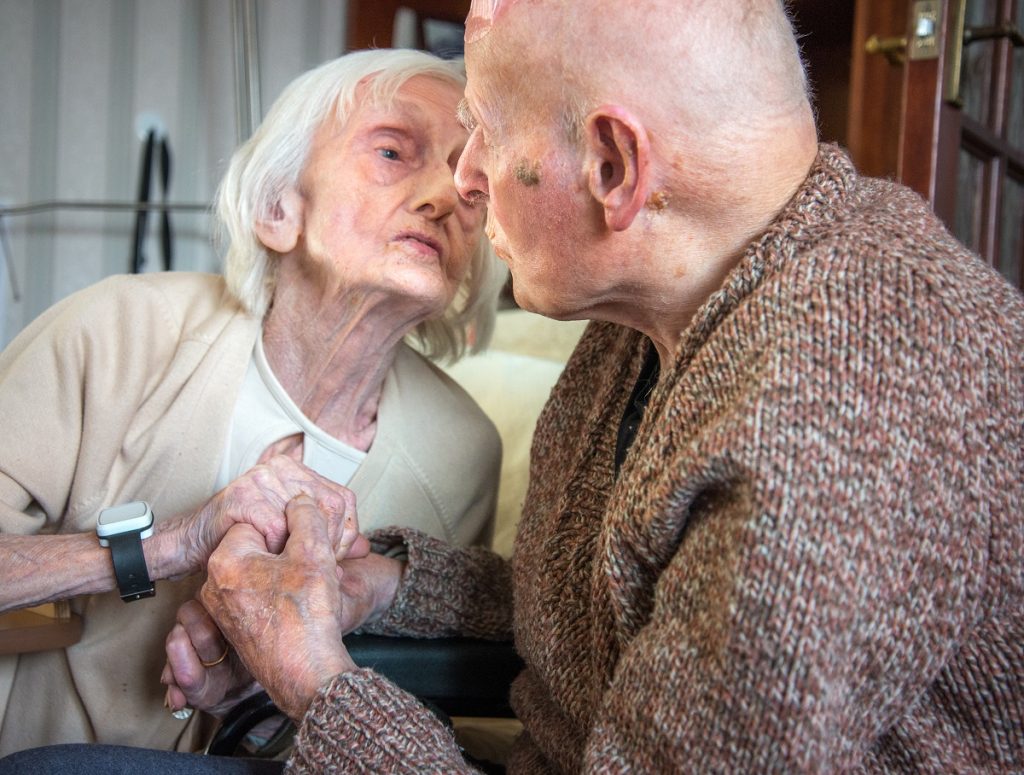When one spouse develops dementia, life changes for the other one too as they become more of a caretaker than a mate. After getting a proper diagnosis for person, the spouse must learn how to live with and help them while learning how to cope with the situation and get the support they need.
Dementia and its consequences — including memory loss — don’t only affect the person diagnosed. Their spouse becomes more than a partner. And often, these people find themselves taking on the caregiver role, helping their dementia-affected loved one enjoy the best quality of life possible.
What Are The Signs Of Dementia You Might Notice In Your Spouse?
Older adults are at more risk of developing dementia. To determine if your spouse has dementia, here are the signs you must watch out for:
- Difficulty completing everyday tasks
- Memory problems interfering with day-to-day abilities
- Misplacing things
- Getting confused and disoriented
- Reduced concentration
- Communication challenges (e.g., difficulty following a conversation or coming up with words)
- Mood swings and personality changes
What Should You Do If Your Spouse Has Dementia?
Acceptance is key if your spouse is diagnosed with a dementia disorder.

Understand that your marriage and family dynamics will change. You will need to add more tasks to your current responsibilities — including overseeing your partner’s condition and medical needs and meeting with medical professionals.
As the disease of your loved one progresses, keep in mind that you will be experiencing more significant changes as well. For instance, you’ll need to modify your home to make it safer for them.
To properly do all this, you must educate yourself about the disease. There are organizations such as the Alzheimer’s Association that offer resources and a helpline/phone number. You can use these to learn more about what the condition could look like, especially in its middle, late, and even early stages, and what techniques you can use to deal with the challenging behaviors they may present.
In dementia care, being a caregiver demands a great deal of patience. You must care for your partner with love and kindness while ensuring their needs are met.

What Are Some Memory Exercises For Your Spouse?
Any caregiving spouse will encounter short-term memory lapses from their dementia-affected partner. To help keep their brain active and delay the rate of brain cell damage, you can try some of these memory exercises:
- Playing board games
- Working on puzzles (e.g., crosswords)
- Playing online games designed to enhance memory
- Picking up a new hobby (e.g., playing the piano)
- Learning something new (e.g., a foreign language)
- Reading
- Writing or journaling
- Signing up for adult education classes in your area
Can Memory Loss Be Restored?
While dementia may cause cognitive decline, it isn’t the only condition that does so. For instance, urinary tract infections, depression, head trauma, and hormonal imbalances can affect brain function, leading to dementia-like symptoms.
In the latter’s case, cognition can improve once the underlying cause is treated. However, memory loss cannot be reversed in the case of a brain disorder.

How Do I Talk To Your Spouse About Dementia?
For a dementia patient, experiencing memory lapses is frustrating, saddening, and confusing. Always take that into account and mind what you’re going to say. When they’re ready, let them speak about their feelings and be a good listener.
When talking to them, use a calm voice and a positive tone. Be concise and break down your thoughts into easy-to-comprehend segments. Also, aid your communication with body language — for instance, gently holding their hands while saying something reassuring is more effective than just stating some words.
When discussing plans for the future, make them feel they are part of the conversation — don’t just lay down some instructions. When needed, tell them therapeutic lies to protect their best interest.
If they are in denial (about their condition or need medical help), be gentle about broaching the topic. Keep a diary of events to provide proof of your concerns and worries. State why doing what you’re suggesting (e.g., visiting a specialist) benefits them and the people around them.
How Do You Live With Someone Who Has Lost Their Memory?
Here are tips for family members providing care for and living with someone with cognitive impairment.
1. Recognize The Changes In Their Abilities And Behavior
Alzheimer’s disease and any other type of dementia will cause affected individuals to suffer from forgetfulness and inability to perform activities of daily living.
Understand that your everyday life will change and that your spouse may be unable to recall important memories. Always treat them with the utmost consideration, put yourself in their shoes, and be patient when looking after them.
2. Modify Your Home And Routine Accordingly
You are responsible for keeping your spouse safe while you live with them at home. From installing a security monitoring system to installing handrails, you must keep your living space as secure as possible. This will help prevent them from getting injured or wandering off.
Also, establish a routine to minimize their risk of displaying confusion, agitation, and other aggressive behaviors. As a caregiver, this will help you efficiently carry out your day-to-day activities. You can also incorporate physical and mental exercises into the routine.
3. Prepare For Challenging Situations
Sometimes your spouse may exhibit unpleasant behaviors — no matter how cautious you are in dealing with them. If you’re living with a dementia-affected person, learn the important skills and techniques you can use to manage such situations.
You must learn how to remain calm and collected. Know how to acknowledge their concern and redirect the conversation so you can turn their attention away from whatever causes aggressiveness, anger, or irritation.
4. Shower Them With Love And Care
While it may be difficult for you to see your spouse suffer from memory loss, among other symptoms, you have to take each day lightly, keep a positive outlook, and perform your caregiving role with love and sincerity. Your genuine care for them will translate into your work and words.
What Are The Options For Couples’ Living When One Has Dementia?
Someone with dementia eventually needs long-term, full-time care. In most cases, patients choose to live at home and receive care from a family caregiver (typically their spouse). To lessen the caregiver’s burden, a couple may outsource help from professionals such as a social worker and a home health aide for in-person care.
Others live in nursing homes, assisted living, or senior living facilities. These communities offer round-the-clock assistance to residents. Some have special memory care units dedicated to attending to the specific needs of dementia patients.
Experts recommend moving patients to care facilities if the disease has significantly progressed, there’s a decline in their overall health, they have little to no social life, and you, as a caregiver, already experience burnout.
What Are The Effects Of One Spouse’s Dementia On The Other?
While rewarding, caring for someone with some form of dementia is full of challenges.
Your life as a couple will change — including seeing your spouse having a reduced interest in intimacy. As their primary caregiver, you will also feel socially isolated and have less time to take care of yourself.
Taking on more responsibilities can also affect your physical and mental health. Research shows that 30 to 40% of dementia carers experience emotional stress and depression.

How To Find Support For Yourself As You Learn How to Deal With A Spouse With Memory Loss
Acknowledging the need to take care of your health is essential to caregiving.
Don’t let yourself carry the burden of supervising someone suffering from memory loss and other consequences of dementia alone. Get help from other family members and professionals so you can take the time to perform wellness activities like exercising and hobbies (e.g., gardening).
Plan and prepare your meals early and consume healthy foods, like lean meat, whole grains, and dark, leafy vegetables. Also, don’t forget to attend regular checkups with your healthcare provider.
Consider availing of respite care and joining a support group. Listening to others’ real-life experiences will give you ideas and inspiration on effectively dealing with a dementia-affected spouse — without forgetting about your well-being.

